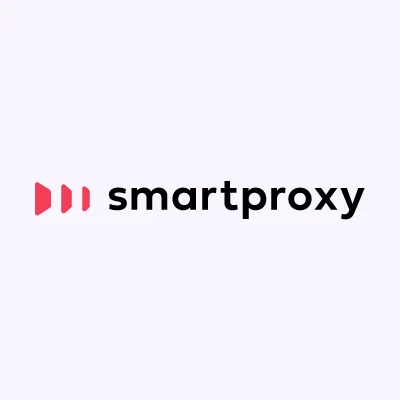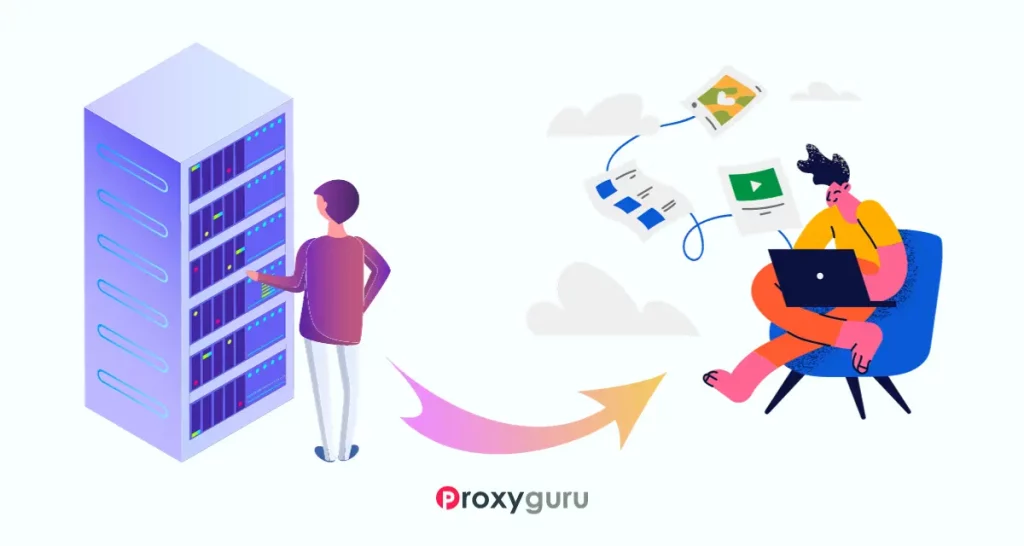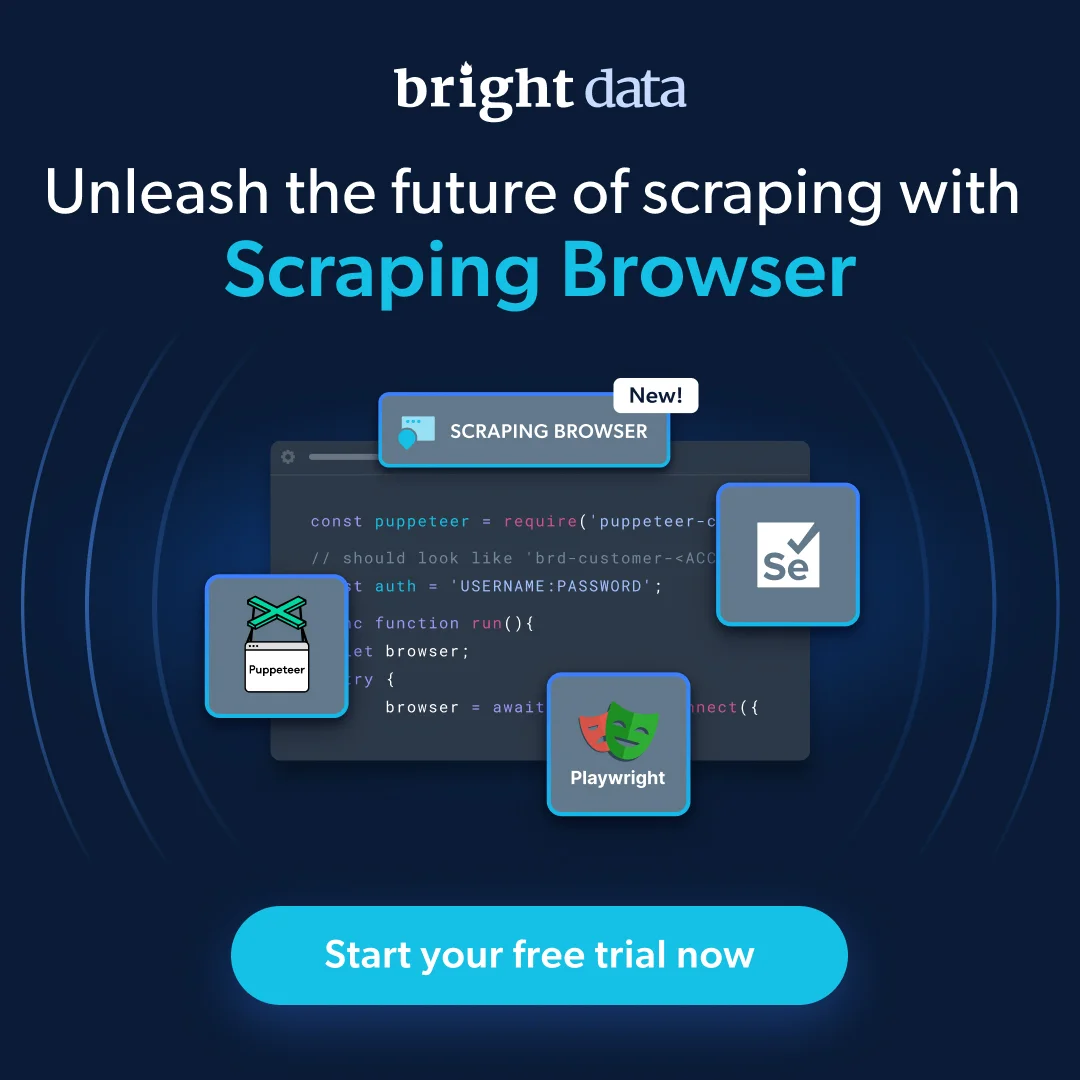Datacenter proxies, often hailed as the speed demons of the proxy world, are like digital sprinters hosted on data center servers. Unlike their cousins, the residential and mobile proxies, they’re the independent mavericks of the proxy world, not tethered to any particular Internet Service Provider (ISP).
Picture them as the jet-setting globetrotters of the internet, residing in remote data center servers, and boasting connection speeds that leave others in the digital dust.
In the digital safari that is this article, we’ll be your trusty guides, shedding light on what datacenter proxies are and demystifying their inner workings. But that’s not all!
We’ll also unveil a treasure trove of the finest datacenter proxy providers, each with its unique set of features and price tags. So, fasten your virtual seatbelts, and get ready for a thrilling exploration of the datacenter proxy universe!
What are Datacenter Proxies?
Datacenter proxies, housed in datacenters rather than personal or residential networks, cloak users’ true IP addresses, bolstering online anonymity. Renowned for their speed and reliability, these proxies are ideal for rapid data retrieval and seamless web access.
Cost-effective in comparison to residential proxies, they’re favored by businesses and individuals alike. They enable IP rotation, helping users bypass website restrictions, and facilitate geo-spoofing, granting access to restricted content.
Additionally, they’re commonly employed in web scraping, aiding in extensive data collection. Notably, some websites detect and block datacenter IP traffic. Hence, their suitability hinges on specific use cases and objectives, balancing anonymity and utility.
How do Datacenter Proxies work?
Datacenter proxies work as intermediaries between a user’s device and the websites or online services they want to access. They are hosted on servers in datacenters, which are typically large facilities equipped with powerful internet connections and multiple IP addresses. Here’s how datacenter proxies function:
Request Forwarding
When a user sends a request to access a website or online service, it first goes through the datacenter proxy server. The proxy server acts as a middleman, forwarding the request to the target website on behalf of the user.
IP Masking
The datacenter proxy server replaces the user’s real IP address with its IP address. This IP masking is essential for maintaining user anonymity and privacy. From the perspective of the target website, it appears that the request is coming from the datacenter proxy’s IP address, not the user’s.
Response Relay
Once the request reaches the target website, the website sends back the requested data or webpage to the datacenter proxy server, believing it is responding to the proxy’s IP address.
Data Relay to User
The datacenter proxy server, having received the data from the website, then forwards it back to the user’s device. To the user, it seems like they are receiving the data directly from the website, even though it has been relayed through the datacenter proxy.
Multiple IP Addresses
Datacenter proxies often have multiple IP addresses, which can be rotated or changed as needed. This IP rotation helps users avoid IP bans or restrictions imposed by websites.
Speed and Performance
Datacenter proxies are known for their speed and performance because they are hosted on high-capacity servers with fast internet connections. This makes them suitable for tasks that require rapid data retrieval or interaction with websites.
Use Cases
Datacenter proxies are commonly used for various purposes, including web scraping, accessing geo-restricted content, maintaining anonymity while browsing, and circumventing IP-based restrictions on websites.
What varieties of Datacenter Proxies are there?
Datacenter proxies are like supercharged internet addresses that live in data centers. They’re faster and super dependable, but sometimes websites can spot them and say, “You’re not welcome here!”
There are several varieties of datacenter proxies, each with its advantages and disadvantages.
Shared Datacenter Proxies
Shared datacenter proxies are the budget option for web access, but they can be slow and sometimes get blocked. They work fine for tasks like bypassing website restrictions and web scraping.
Dedicated Datacenter Proxies
Dedicated datacenter proxies are your exclusive, high-speed lane on the internet, serving only you for top performance and reliability.
Rotating Datacenter Proxies
Rotating datacenter proxies are like shape-shifters that change their IP addresses automatically. They can be shared or dedicated, with dedicated ones offering more privacy and reliability, although they are a bit pricey. However, they provide the highest level of anonymity and reliability.
How can Datacenter Proxies be beneficial?
Datacenter proxies offer several benefits that can be advantageous in various online scenarios:
Speed and Reliability
Datacenter proxies are known for their fast connection speeds and high reliability. Since they are hosted in data centers with powerful infrastructure, they can quickly fetch and deliver web content, making them ideal for tasks requiring speed and stability.
Cost-Effective
Datacenter proxies are often more affordable than other types of proxies, such as residential or mobile proxies. This makes them a cost-effective choice for businesses and individuals with budget constraints.
Anonymous Browsing
Datacenter proxies provide a layer of anonymity for users, as they mask the user’s IP address with the proxy server’s IP. This helps protect privacy and security while browsing the internet.
Web Scraping and Crawling
Datacenter proxies are commonly used in web scraping and crawling applications. They enable users to access and extract data from websites without getting blocked or rate-limited, thanks to their speed and reliability.
Load Balancing
Businesses can use datacenter proxies to distribute network traffic and balance server loads. This can improve website performance and ensure high availability.
Best Datacenter Proxy Providers to Consider in April 2025
Oxylabs
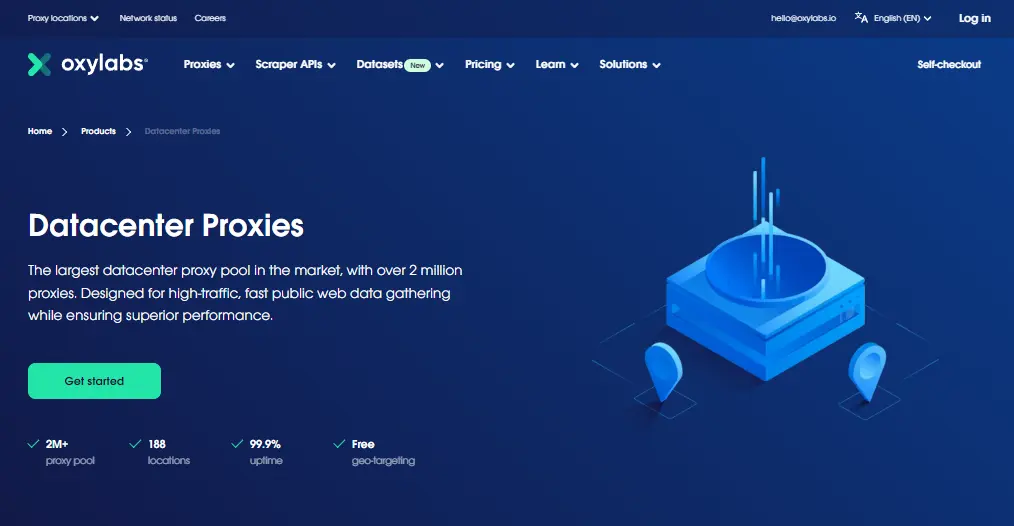
Oxylabs excels as a top-tier proxy provider, especially for residential IPs, boasting the world’s largest network of datacenter proxies. They offer versatile proxies with two million dedicated IPs spanning 188 countries. Their shared proxies provide flexibility with 29,000 addresses across 15 locations.
While they offer a user-friendly dashboard for shared IPs, dedicated proxies require customization from their expert team.
Oxylabs primarily serves larger businesses and lacks a pay-as-you-go option, so their entry-level plan with 100 proxies may be overkill for smaller tasks.
Features
- Over 102 million IPs
- All countries supported
- Unlimited bandwidth, threads & domains
Bright Data
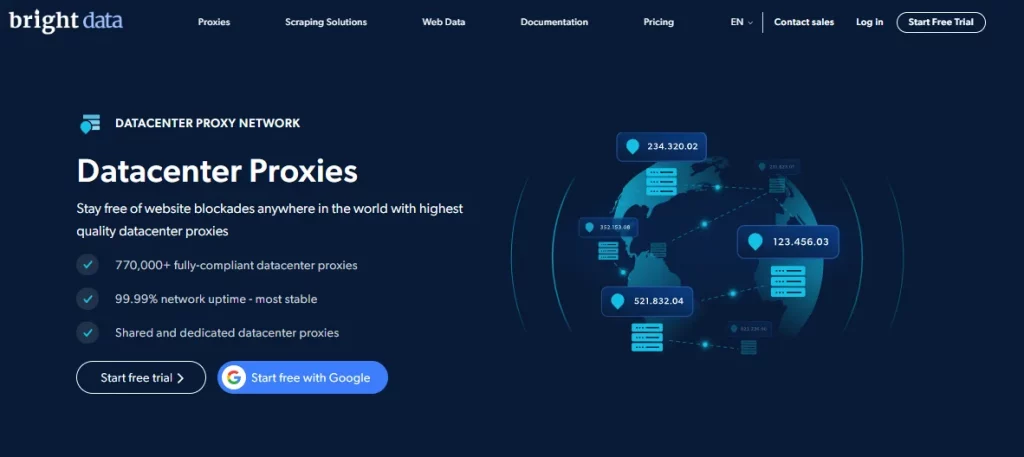
Bright Data, another top-tier data proxy provider in our lineup, offers users access to a pool of 20,000 addresses or a carefully curated selection of stable shared IPs from 80 different locations. They boast 3,000 dedicated addresses spread across various subnets and provide versatile proxy management options.
Bright Data’s proxies allow for precise city and country targeting, with a presence in over 50 global locations. Users can choose to maintain IPs for as long as they’re available or rotate them with every request, ensuring 100% uptime.
However, this adaptability can affect pricing, potentially increasing costs for unlimited traffic or unused IPs. Quality remains their hallmark.
Features
- Over 72 million IPs
- Unlimited threads
- 95 dedicated countries and over shared 80 countries
Netnut
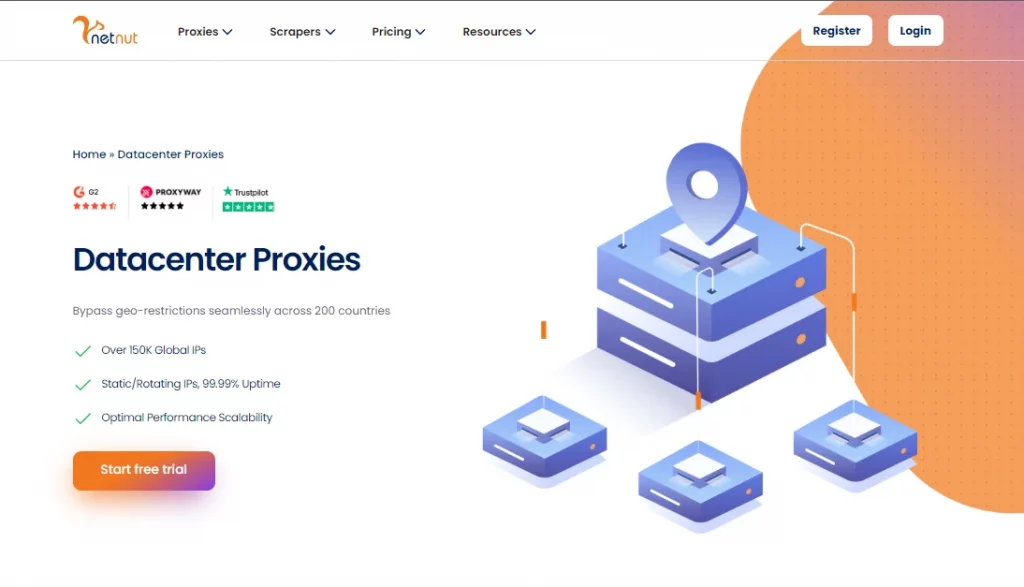
NetNut offers over 100,000 US datacenter IPs that change with each request and allow for sticky sessions lasting up to two days. Registration is a breeze with just three steps, and no human interaction is needed.
While considered a premium provider, pricing starts at $100 ($1/GB) but becomes more attractive at $350 and up, unlocking features like a dedicated manager and live support, dropping the price to $0.70/GB.
However, it remains above the market average. Drawbacks include slower proxies in testing and a lengthy FAQ-style documentation. NetNut shines with its vast IP selection but has some speed and usability quirks to consider.
Features
- Unlimited threads, bandwidth & domains.
- Rotation of every request & sticky sessions
IPRoyal
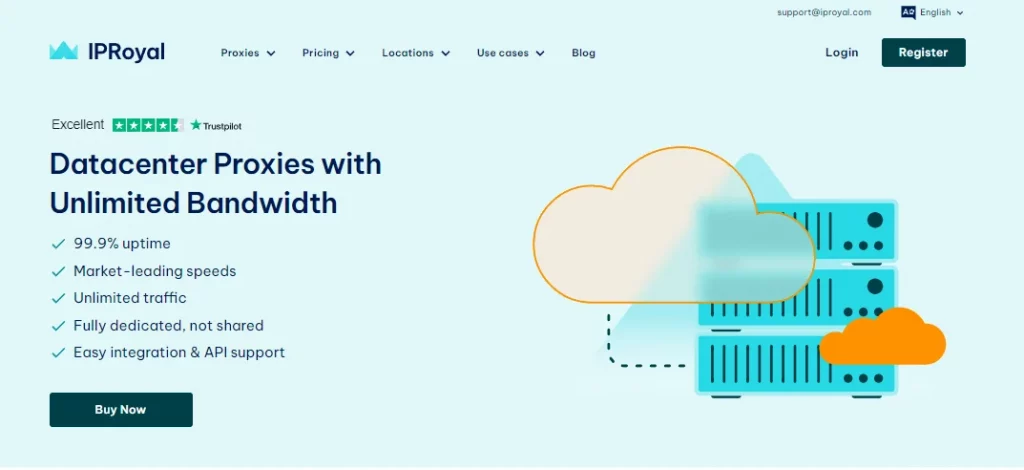
IPRoyal offers an exceptional deal on dedicated IP addresses, available in approximately 30 locations. What sets IPRoyal apart is its budget-friendly approach; you can grab 5 IPs for just $9, which works out to a mere $1.80 per IP address. They also provide unlimited traffic and threads, along with a monthly refresh at no extra cost.
For sneaker enthusiasts seeking proxies that work seamlessly on shoe websites, IPRoyal offers a private proxy pool. However, it’s worth noting that their service, though affordable, lacks certain features.
You won’t have the flexibility to switch proxies, and each plan is limited to targeting only one country. Additionally, you won’t have access to the entire IP pool, potentially leading to quicker IP depletion.
Features
- Non-expiry data
- Reseller-friendliness
- Pay-as-you-go
- SOCKS5 support
- Ethically sourced IPs
Rayobyte
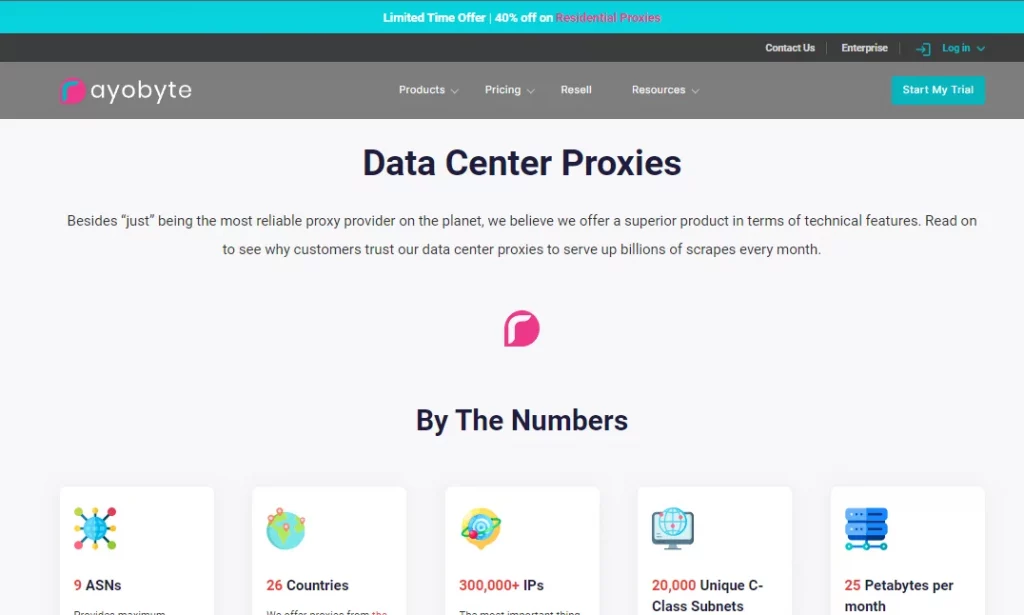
Rayobyte offers diverse proxy options: shared, dedicated, and rotating. No limits on threads, traffic, or domains. Subscriptions or one-time purchases are available.
Shared proxies: 3 types, from 5 IPs in 11 countries to 60,000 rotating (still in beta). Dedicated proxies: Static, spread across 20,000 C-class subnets, 300,000 addresses in 26 countries.
However, longer rotations aren’t great for scraping, and they support fewer locations than some premium providers.
Features
- Unlimited threads, traffic, and domains, monthly refresh
- 30 (dedicated), 9 (shared), and 3 (rotating) countries
Webshare
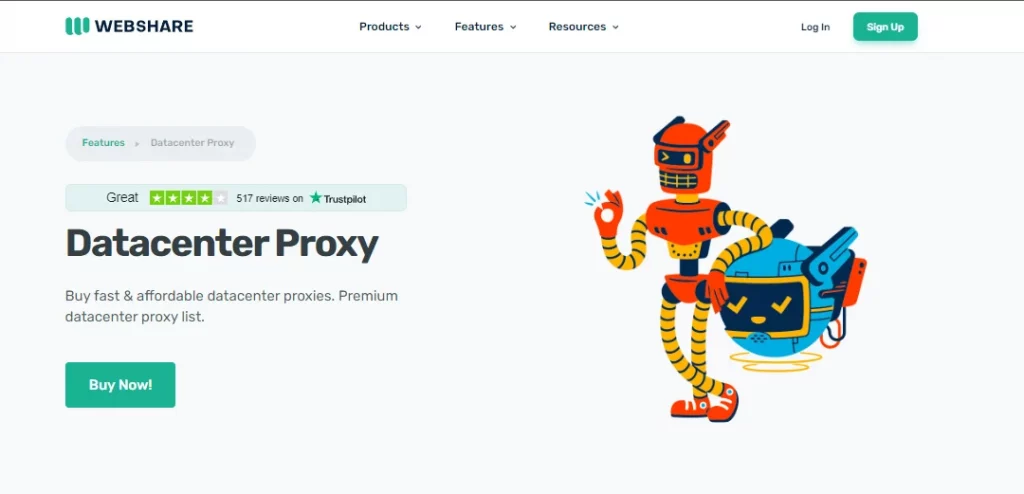
Webshare offers three types of proxies for your internet adventures: shared, semi-shared, and dedicated, supporting HTTP(S) and SOCKS in over 40 countries. You can customize everything, and their user-friendly dashboard makes it easy for newcomers.
They even have a free plan with 10 proxies and 1 GB of data. Prices are budget-friendly, but customer support is email-based. It’s like a friendly guide in the online jungle!
Features
- 500 – 3,000 threads
- unlimited bandwidth (optionally)
Smartproxy
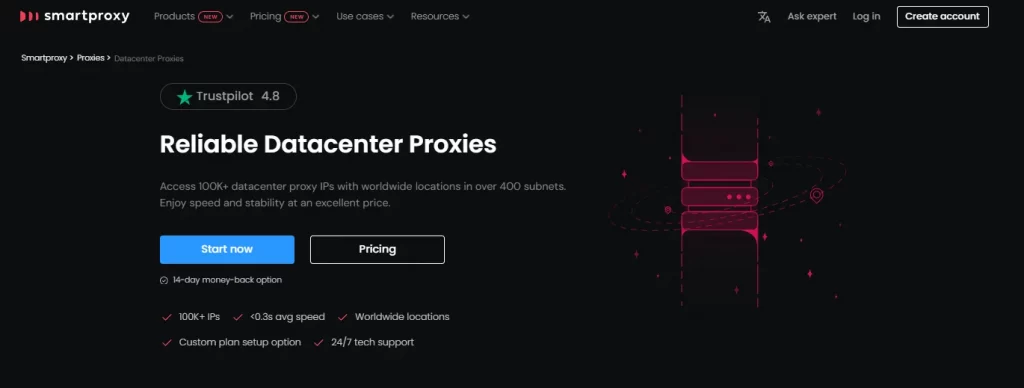
Smartproxy offers two types of internet keys: shared and dedicated proxies. Shared proxies provide access to a massive pool of 100,000 IPs in the US and Europe, or select IPs from around the world. These proxies allow unlimited connections and change with every request, making them perfect for web scraping.
You can even lock in a specific IP for 30 minutes. On the other hand, dedicated US proxies offer personalized access, with options for sequential or non-sequential IPs and different protocols. Smartproxy’s shared plans are cost-effective and flexible, while dedicated plans can scale up to 4,000 proxies.
Plus, their top-notch customer service is always there to assist you.
Features
- 195 countries allowed
- Over 65 million IPs
- 24/7 customer support via LiveChat
- Unlimited traffic with dedicated datacenter proxy plans.
FAQs
What Are Datacenter Proxies?
Datacenter proxies are intermediary servers hosted in data centers, often used for anonymity, security, and web scraping.
What Are the Benefits of Using Datacenter Proxies?
Datacenter proxies offer speed, reliability, and IP diversity, making them suitable for various online activities, including web scraping, SEO, and market research.
How Do Datacenter Proxies Compare to Residential Proxies?
Datacenter proxies are faster and more affordable than residential proxies but may be less reliable for certain use cases due to their static nature.
What Should I Consider When Choosing a Datacenter Proxy Provider?
Factors to consider include the provider’s location coverage, proxy pool size, pricing, IP rotation options, and customer support.
Do Datacenter Proxies Rotate IPs?
Many datacenter proxy providers offer IP rotation, allowing users to switch between different IP addresses to avoid detection or access geo-restricted content.
Are Datacenter Proxies Suitable for Web Scraping?
Yes, datacenter proxies are commonly used for web scraping due to their speed and stability. However, some websites may block them.
How Can I Test the Quality of Datacenter Proxies Before Purchasing?
Look for providers that offer trial periods or money-back guarantees. Testing proxies with small plans is also a good way to assess their quality.
Conclusion
Selecting the best datacenter proxy provider in 2025 hinges on individual requirements. Datacenter proxies excel in speed and reliability for tasks like web scraping, SEO, and market research. Key considerations include provider coverage, proxy pool size, pricing, IP rotation options, and customer support.
Shared proxies offer budget-friendly access, while dedicated proxies offer exclusivity at a higher cost. It’s wise to leverage trial periods or money-back guarantees to assess proxy quality.
Legal compliance and adherence to provider terms are crucial. The ultimate choice depends on aligning the provider’s offerings with your specific goals, ensuring secure and dependable proxy solutions for your 2025 needs.

